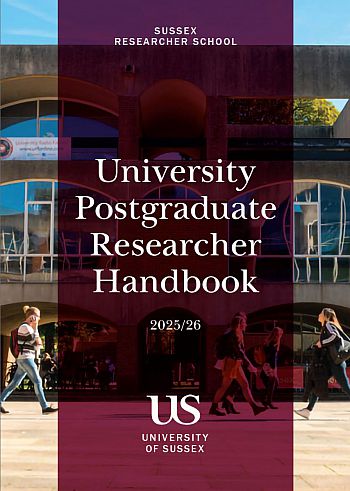Getting started on your research degree
On this page you will find information about things you need to be aware of and do in the lead up to commencing your research degree, and during your first few weeks and months of your registration.
You can find more information on starting at Sussex as a new PGR, including registration, moving to Brighton, and funding and finances, on our New PGRs pages.
Induction
The Sussex Researcher School (SRS) provides centralised induction events for PGRs, typically in October and February. You are expected to attend the University induction relevant to your start date. More information is available on our PGR Induction pages.
In addition to the central induction run by the SRS, Faculties/Schools will provide a comprehensive, local induction programme for you that includes Faculty-/School-specific information on supervisory arrangements, research and skills training, networking opportunities, facilities, good research conduct, and health and safety, including (where appropriate) health and safety while undertaking work away from the University (e.g. fieldwork and research visits). Your Faculty/School will also provide you with a handbook (or equivalent resource) for reference.
In addition to these events, you are encouraged to familiarise yourself with the information on these pages, and in particular: Your supervision, Your attendance, Your progress, and Regulations, policies and procedures.
PGR Handbook
The central University PGR Handbook – that sits alongside the handbook for your specific research degree, which will be provided by your Faculty/School – summarises and sign-posts you to information to support you at every stage of your research journey.
Mandatory training
All PGRs commencing their registration on or after 01 August 2025 are required to complete mandatory training in Research Ethics and Integrity and in Research Data Management. These online modules, which can be found on Canvas (see Introduction to Research Ethics and Integrity for PGRs and Introduction to Research Data Management for PGRs), must be completed by the time you submit your Research Plan (see below).
Research plan
Within your first six months if you are registered full-time, or first twelve months if you are registered part-time, you must prepare a research plan (or Faculty/School equivalent) which sets out the overall plan, objectives and timetable for your project. Your Faculty/School will identify the specific deadline for completion of the plan. A form to confirm the content and working title of your thesis and research plan must be submitted by you and your main supervisor for approval within your Faculty/School per the local process.
Please note:
- Should you wish to change the title of your thesis after approval of your Research Plan, you should consult your main supervisor in the first instance. If your supervisor agrees with the change you should then complete and submit an application form which is available on the Forms and Letter Requests page. If you are sponsored by the University on a Student Visa, changing your thesis title can have implications for future visa applications: you must consult an International Student Adviser before submitting the application form.
The ThinkWell website, run by Hugh Kearns, includes some useful worksheets to aid with you planning your research degree, by breaking up your work into more manageable chunks.
Ethical review
All PGRs whose research involves living subjects will require ethical approval. Depending on the focus and methodology, other research may also require ethical approval. The checklist Do I need ethics approval for my research? will help you to determine whether ethical review is needed.
Where formal ethical approval from an internal ethics committee (and, where necessary, an external body) is needed, the main supervisor and the PGR will be jointly responsible for securing this in accordance with the Code of Practice for Research before the research commences. For more information about the process, please refer to the Research Governance and Integrity pages.
Please note:
- Confirmation of ethical approval (where needed) is required for your Formal Progression Reviews and when you submit your thesis.
- With respect to research integrity more broadly, the University's 'Statement on the Use of Generative AI (GenAI) by Postgraduate Researchers' (Appendix 6 of the Procedures on Research Degrees) provides guidance around acceptable use and maintaining good academic practice.
Data Management Plan
As per the University’s Research Data Management Policy, you are expected to have an appropriate data management plan for your research. You should have this in place by your first Formal Progression Review and you may wish to consider the data management for your project when drafting your Research Plan (see above). Your data management plan should be updated as required and checked at subsequent Formal Progression Reviews (where applicable).
Training Needs Analysis
You must complete a Training Needs Analysis with your supervisor at the start of each year of registration (or part-time equivalent). By reflecting on your training needs you can identify areas for development and then target specific workshops and courses, such as those offered via SRS in the Researcher Development Programme. Your Training Needs Analysis should be considered during your Formal Progression Reviews.
Personal web profile
Once you have commenced your research degree you are encouraged to set up a personal profile on the University’s website. The profile facility allows you to present yourself and your research on the Sussex website and you can also ask your Faculty/School to display your profile on the Faculty/School webpages. This can help raise your academic profile and promote your research.



